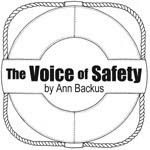Holding On – Some Thoughts
From IFISH5
by Ann Backus, MS

Choppy waves, howling wind, and lightning – they can make it all at the Offshore Safety and Survival Center (OSSC) – in St. John’s Newfoundland Labrador. Forty of us, fishing safety researchers and trainers, stood on the wet floor surrounding a huge wave tank as operators manipulated the conditions in the tank – varying wind speed, adding lightning, and simulating choppy seas. A large rubber ball bobbing in the tank usually has a trainee holding on tightly and trying to survive “the storm.”
Hovering above the survival tank is a HUET – a helicopter underwater escape trainer – that can be lowered into the survival tank and inverted to teach underwater escape skills. This state-of-the-art environmental theatre is a facility of the Fisheries and Marine Institute of Memorial University in Newfoundland Labrador.
While at the OSSC, we also saw a massive fire training demonstration on the fire training ground. The equipment we didn’t see included lifeboats and fast rescue craft plus their launching equipment and a “seagoing” marine training vessel.

Offshore Safety and Survival Center (OSSC Hovering above the survival tank is a HUET – a helicopter underwater escape trainer – that can be lowered into the survival tank and inverted to teach underwater escape skills. Ann Backus photo.
In addition to providing training courses for the fishing industry, OSSC clientele include the petroleum industry, marine transport, and general safety and firefighting training.
The Marine Institute offers a wide array of courses. For those of you who are interested in or starting in aquaculture, the course on Fishing, Aquaculture and Small Boating Industry might be of interest. According to the Institute’s website, this course can be offered in communities (not sure if they would come to the U.S.) or online. Here is the URL: https://www.mi.mun.ca/programsandcourses/shortcourselist/?id=PS0004&title=Fishing,%20Aquaculture%20and%20Small%20Boat%20Industry.
Speaking of aquaculture
The reason for my being at Memorial University, St. John’s was the Fifth International Fishing Industry Safety and Health Conference (IFISH5). About 150 fishing safety researchers from around the world gathered for 3-plus days of presentations and discussions on fishing safety, injuries, regulations, and fisheries management. For the first time, this congress for fishing safety researchers and professionals included a full track of sessions on aquaculture and seafood processing.
The aquaculture track sessions addressed regional approaches to aquaculture and seafood processing, the hazards, policy and practice, exposure assessment, and of course, safety and health. Speakers from Norway, Sweden, Greenland, Canada, Thailand, South Africa, and the U.S. discussed risk management at fish farms and in fish processing plants. There were a number of sessions on the prevalence of respiratory ailments such as asthma, allergies resulting from airborne particulates during fish processing, and exposure to toxic gases such as H2S in fish holds.
With the decline in fish stocks around the world, there is a rapid rise in aquaculture and fish farming in all corners of the globe. This segment of the fishing industry presents its own hazards and risks. Only recently have researchers who study bioaerosols become involved in bioaerosol exposure in the fish farming and processing segment as a workplace illness issue.
Dehydration in fishermen
Dehydration slows
musculo-skeletal response
and cognition.
IFISH5 was a superb conference. The sessions on fishing hazards, injuries, and interventions to reduce injuries and fatalities were excellent; the response to my session on Responding to Emergencies at Sea and to Communities Under Extreme Stress was very positive (thankfully).
I was particularly struck by a presentation by an ergonomist from New Zealand who discussed how dehydration slows musculo-skeletal response and cognition. Her research on sea-going crews showed clearly that fishermen do not drink enough water while on board. Well, many if not most of us do not drink the recommended 8 glasses of water per day, but for fishermen, the intensity of the work does not encourage breaks for water – coffee and tea do not count!
Given that dehydration slows response and thinking ability, she recommended that fishermen could reduce the number of musculo-skeletal accidents and improve decision-making if they increased their water consumption.
Here it is summer in the Northeast, and we have seen some pretty high temperatures in July; this is a good time for all of us to remind ourselves, whether fishing or not, that drinking a substantial amount of water is extremely important to a well-functioning body and brain. After all, we want to be able to hold on during “the storm.”
Ann Backus, MS is an Instructor in Occupational Health at Harvard School of Public Health, 665 Huntington Ave., Boston MA 02115, 617-432-3327, abackus@hohp.harvard.edu.
